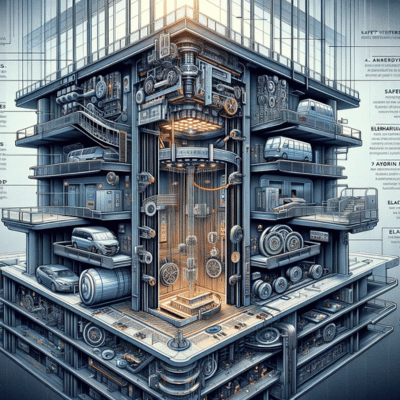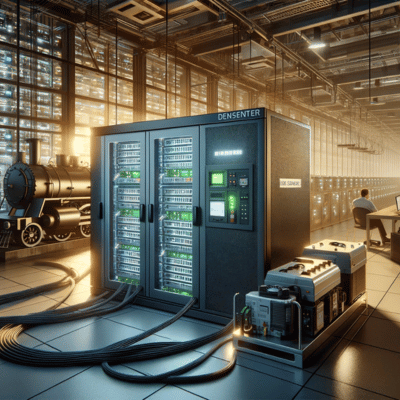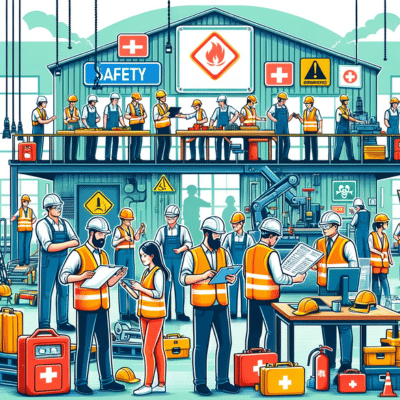Blog Posts
The Future of Elevator Backup Systems in Urban Buildings

In the ever-evolving landscape of urbanization, the safety and reliability of elevator backup systems in high-rise buildings are paramount. As cities continue to grow vertically, the need for robust elevator backup systems becomes increasingly crucial.
Join us as we delve into the growing importance of these systems, exploring how they not only meet evolving safety standards but also address the unique challenges posed by urbanization trends. Stay tuned as we uncover the future of elevator backup systems and their vital role in ensuring seamless vertical mobility in urban environments.
Elevator Backup Systems: Ensuring Vertical Mobility
Elevator backup systems are essential components of modern urban infrastructure, ensuring uninterrupted vertical mobility in high-rise buildings. These systems serve as lifelines during power outages or emergencies, allowing occupants to safely navigate between floors. By providing reliable backup power, elevator backup systems uphold the functionality and accessibility of buildings, especially in densely populated urban areas where vertical transportation is indispensable. From ensuring safety compliance to addressing the challenges of urbanization, these systems play a vital role in maintaining seamless vertical mobility and enhancing overall building resilience.
Reliability in High-Rise Buildings
Reliability in high-rise buildings is paramount, especially when it comes to elevator systems. Elevators are critical for vertical transportation, and any downtime can significantly disrupt building operations and inconvenience occupants. Therefore, ensuring the reliability of elevator systems, particularly in high-rise structures, is essential.
This includes implementing robust backup power solutions, such as UPS systems and battery backup systems, to ensure continuous operation during power outages. Additionally, regular maintenance and compliance with safety standards are vital to minimize the risk of breakdowns and ensure smooth operation. By prioritizing reliability, high-rise buildings can provide seamless vertical mobility for occupants and maintain operational efficiency even in challenging circumstances.
Addressing Urbanization Trends
Addressing urbanization trends is crucial for the effective design and implementation of elevator backup systems in modern buildings. As urban populations continue to grow and cities become denser, the demand for reliable vertical transportation solutions escalates. Elevator backup systems play a pivotal role in meeting this demand by ensuring uninterrupted mobility, even in the event of power outages or emergencies.
By considering urbanization trends such as increasing building heights and population density, designers and engineers can tailor backup solutions to meet the unique challenges posed by urban environments. This proactive approach not only enhances the safety and functionality of buildings but also contributes to the overall resilience of urban infrastructure.
Importance of Backup Power in Elevator Systems
The importance of backup power in elevator systems cannot be overstated, particularly in high-rise buildings and densely populated urban areas. Elevators are critical for vertical transportation, providing essential mobility for occupants and facilitating efficient building operations. During power outages or emergencies, reliable backup power ensures that elevators remain operational, allowing for safe evacuation, access to emergency services, and continued functionality of essential building services. Battery backup systems and UPS (Uninterruptible Power Supply) units play a vital role in maintaining elevator operation during such situations, highlighting the indispensable role of backup power in ensuring the safety and functionality of elevator systems.
Backup Power Requirements
Ensuring adequate backup power is essential for the reliable operation of elevator systems, particularly in high-rise buildings and densely populated urban areas. Backup power requirements encompass various factors, including the capacity of backup systems, their response time during power outages, and compliance with safety standards. Battery backup systems and uninterruptible power supply (UPS) units are commonly employed to fulfill these requirements, providing seamless power transition and continuous operation of elevator systems in critical situations. By meeting backup power requirements, building owners and operators can enhance the safety and functionality of their elevators, ensuring uninterrupted vertical mobility for occupants.
Battery Backup Systems for Seamless Operation
Battery backup systems play a pivotal role in ensuring the seamless operation of elevator systems, especially during power outages or emergencies. These systems provide a reliable source of backup power, allowing elevators to continue functioning even when utility power is unavailable. Battery backup systems are designed to offer immediate power support, enabling elevators to safely transport occupants to their destinations or facilitate emergency evacuations.
With their ability to store energy and deliver it when needed, these systems contribute to the resilience and reliability of elevator operations, ensuring uninterrupted vertical mobility in various settings, from high-rise buildings to urban infrastructure.
Safety and Compliance: Meeting Building Code Enforcement
Safety and compliance with building codes are paramount considerations in the design and operation of elevator systems. Meeting building code enforcement standards ensures that elevators are safe for public use and adhere to regulatory requirements. Elevator systems must comply with various safety codes and regulations, covering aspects such as structural integrity, emergency procedures, accessibility, and electrical safety.
Regular inspections and adherence to safety protocols are essential to maintain compliance with building codes and ensure the safety of elevator passengers. By prioritizing safety and compliance, building owners and operators can instill confidence in occupants and uphold the integrity of their vertical transportation infrastructure.
Proper Heat Dissipation for Elevator Systems
Proper heat dissipation is critical for the efficient and safe operation of elevator systems. Elevator components, such as motors, controllers, and braking systems, generate heat during operation, which can lead to performance issues and premature wear if not adequately managed. Effective heat dissipation mechanisms, such as ventilation systems and heat sinks, help dissipate excess heat, maintaining optimal operating temperatures and prolonging the lifespan of elevator components. By ensuring proper heat dissipation, building owners and operators can enhance the reliability and longevity of their elevator systems, minimizing downtime and maintenance costs while maximizing passenger safety and comfort.
Final Inspection and UL Certification
Final inspection and UL (Underwriters Laboratories) certification are crucial steps in ensuring the safety and reliability of elevator systems. Before being put into service, elevators undergo rigorous final inspections to verify compliance with safety standards and regulatory requirements. UL certification, in particular, signifies that the elevator system meets stringent safety and performance criteria set by UL, a globally recognized independent safety science company.
Elevators bearing the UL certification mark instill confidence in building owners, operators, and occupants, assuring them of the system’s adherence to the highest safety standards. By completing final inspections and obtaining UL certification, elevator systems demonstrate their commitment to safety and reliability, fostering trust and peace of mind among stakeholders.
Urban Challenges: Elevators in Multi-Story Buildings
Elevators in multi-story buildings face unique challenges in urban environments. As cities grow denser and buildings taller, the demand for efficient vertical transportation escalates. Elevator systems must contend with factors such as increased passenger traffic, longer travel distances, and the need for rapid response times. Additionally, urban constraints such as limited space for equipment installation and maintenance further complicate elevator operation and management.
Addressing these challenges requires innovative solutions, including advanced elevator technologies, optimized traffic management systems, and proactive maintenance strategies tailored to urban settings. By overcoming urban challenges, elevator systems can enhance the accessibility, efficiency, and safety of multi-story buildings, meeting the evolving needs of urban dwellers and businesses.
Continuous Power in Cities
Continuous power is crucial for urban infrastructure, especially for essential services like elevator systems in cities. In densely populated areas, uninterrupted power supply is vital to ensure seamless vertical mobility within high-rise buildings and commercial complexes. Any power interruption can disrupt daily activities and pose safety risks.
Therefore, reliable backup power solutions such as battery backup systems and uninterruptible power supply (UPS) units are essential to maintain continuous elevator operation during outages. By ensuring continuous power in cities, elevator systems can uphold efficiency, safety, and convenience for residents, workers, and visitors alike.
Addressing Access and Rise in Urban Areas
Addressing access and rise in urban areas presents significant challenges for elevator systems. As cities continue to grow vertically, with more multi-story buildings being constructed, the demand for efficient vertical transportation escalates. Independent elevator companies specializing in battery backup systems play a crucial role in meeting these demands. These companies ensure proper heat dissipation within elevator systems, maintaining normal operating currents even during peak usage times.
They also adhere to stringent building code enforcement standards and undergo UL certification, guaranteeing exceptional performance and safety. By fulfilling these requirements, elevator systems installed in multi-story buildings can handle continuous use and provide reliable vertical mobility, meeting the rising demands of urban infrastructure.
Future Trends: Innovations in Elevator Backup Systems
Future trends in elevator backup systems are poised to revolutionize urban infrastructure. As cities face increasing challenges related to power outages and rising demands for vertical mobility, innovative solutions are emerging. Global industry leaders are focusing on developing battery backup systems with advanced features, such as enhanced heat dissipation and improved energy storage capacity. These systems are designed to meet the continuous power requirements of elevators in multi-story buildings, ensuring uninterrupted operation during utility power failures.
Moreover, specialized companies are exploring new technologies, including UPS units and energy-efficient accessories, to further enhance elevator backup systems’ reliability and performance. By embracing these innovations, the future of elevator backup systems looks promising, offering cities around the world robust solutions to address urbanization challenges and ensure seamless vertical transportation.
Adapting to Urbanization Trends
Adapting to urbanization trends is crucial for elevator systems to meet the evolving needs of modern cities. As urban areas continue to expand, the demand for efficient vertical transportation escalates. Elevator companies specializing in battery backup systems play a pivotal role in this adaptation process. By designing systems that fulfill the rigorous requirements of multi-story buildings, these companies ensure seamless vertical mobility even during power outages.
They address challenges such as proper heat dissipation and comply with building code enforcement standards to guarantee safety and reliability. With a focus on innovation and sustainability, these companies are paving the way for elevators to become integral components of urban infrastructure, facilitating accessibility and connectivity in bustling cityscapes.
Integration of New Technologies
The integration of new technologies is revolutionizing elevator systems, particularly in the realm of backup power solutions. With the emergence of advanced battery backup systems, elevator companies are embracing innovation to address the evolving needs of urban infrastructure. These systems, designed by global industry leaders, incorporate cutting-edge features such as enhanced energy storage capacity and improved heat dissipation mechanisms. Moreover, the utilization of UPS units and energy-efficient accessories further enhances the reliability and performance of elevator backup systems. By integrating these new technologies, elevator companies are not only ensuring uninterrupted vertical transportation but also contributing to the sustainability and resilience of urban environments.
The Future Landscape: Elevator Backup Systems Worldwide
The future landscape of elevator backup systems worldwide is undergoing a transformative shift driven by technological advancements and urbanization trends. As cities continue to expand vertically, the demand for reliable vertical transportation escalates. Elevator companies, including independent firms specializing in battery backup systems, are at the forefront of this evolution. These companies are developing innovative solutions to meet the growing need for continuous power in multi-story buildings. By incorporating advanced features such as enhanced heat dissipation and improved energy storage capacity, elevator backup systems are becoming more resilient and efficient.
Moreover, the integration of UPS units and other cutting-edge technologies further enhances their reliability, ensuring uninterrupted operation during power outages. As a result, the future landscape of elevator backup systems promises to revolutionize urban infrastructure, offering sustainable and resilient solutions to meet the vertical mobility needs of cities worldwide.
Expanding Support for Urban Infrastructure
Expanding support for urban infrastructure entails addressing the increasing demands for reliable vertical transportation in bustling cities. Elevator companies specializing in battery backup systems are playing a pivotal role in meeting these challenges head-on. By developing innovative solutions tailored to the unique needs of multi-story buildings, these companies ensure seamless vertical mobility, even during power outages.
With a focus on enhancing heat dissipation and complying with rigorous building code enforcement standards, they guarantee the safety and reliability of elevator systems. Through the integration of new technologies and sustainable practices, these companies are not only expanding support for urban infrastructure but also shaping the future of vertical transportation in cities worldwide.
Global Trends in Elevator System Backup
Global trends in elevator system backup are pivotal in shaping the future of vertical transportation infrastructure worldwide. Elevator companies are increasingly focusing on developing innovative solutions to ensure uninterrupted operation, especially in urban areas. These solutions include advanced battery backup systems designed to withstand the demands of multi-story buildings and comply with stringent building code enforcement standards. Moreover, industry leaders are integrating cutting-edge technologies like UPS units and energy-efficient accessories to enhance reliability and efficiency.
By staying at the forefront of global trends in elevator system backup, companies are not only meeting the evolving needs of urban environments but also contributing to the resilience and sustainability of vertical transportation infrastructure on a global scale.
Conclusion
In conclusion, the global trends in elevator system backup underscore the importance of reliability and resilience in vertical transportation infrastructure. As cities continue to grow and urbanize, the demand for uninterrupted elevator operation becomes increasingly critical. Elevator companies are rising to the challenge by developing innovative solutions that prioritize safety, efficiency, and sustainability. By embracing these trends and integrating advanced technologies, the future of elevator system backup looks promising, ensuring smooth vertical mobility for urban dwellers around the world.

















